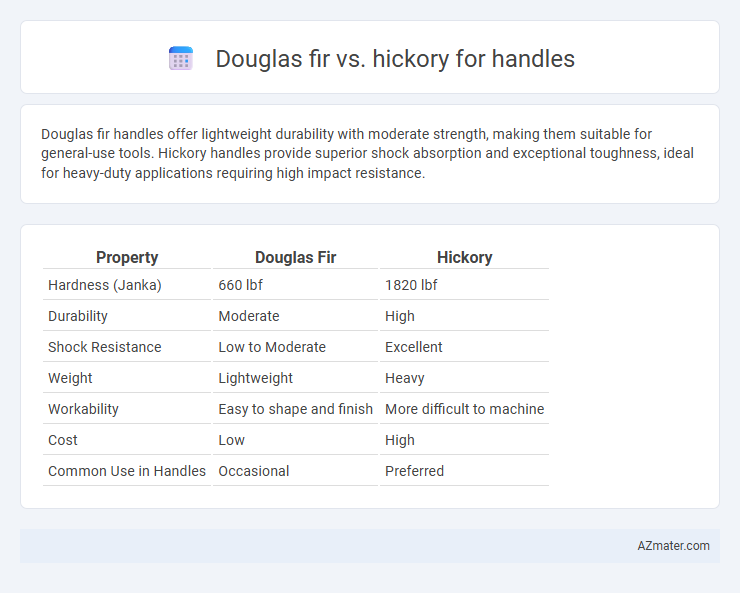Douglas fir handles offer lightweight durability with moderate strength, making them suitable for general-use tools. Hickory handles provide superior shock absorption and exceptional toughness, ideal for heavy-duty applications requiring high impact resistance.
Table of Comparison
| Property | Douglas Fir | Hickory |
|---|---|---|
| Hardness (Janka) | 660 lbf | 1820 lbf |
| Durability | Moderate | High |
| Shock Resistance | Low to Moderate | Excellent |
| Weight | Lightweight | Heavy |
| Workability | Easy to shape and finish | More difficult to machine |
| Cost | Low | High |
| Common Use in Handles | Occasional | Preferred |
Introduction: Douglas Fir vs Hickory for Tool Handles
Douglas Fir offers lightweight strength and good shock absorption, making it a practical choice for tool handles requiring moderate durability. Hickory is renowned for its exceptional hardness, impact resistance, and flexibility, providing superior performance in heavy-duty applications. Both woods balance weight and strength differently, influencing their suitability based on tool use and user preference.
Wood Properties: Strength and Durability
Douglas fir offers exceptional strength-to-weight ratio and moderate durability, making it a lightweight yet sturdy choice for handles exposed to moderate stress. Hickory is renowned for its superior hardness, shock resistance, and exceptional durability, often preferred for heavy-duty handles requiring long-term wear resistance. While Douglas fir is easier to work with and less dense, hickory's toughness ensures better performance in applications subjected to high impact and abrasion.
Weight and Balance Comparison
Douglas fir handles are notably lightweight, contributing to excellent overall tool balance and reduced user fatigue during prolonged use. Hickory handles are heavier but offer superior strength and shock absorption, providing a well-balanced feel that enhances control and durability. When comparing weight and balance, Douglas fir excels in ease of handling, while hickory delivers robust balance for precision and power.
Shock Absorption Capabilities
Douglas fir exhibits moderate shock absorption qualities due to its lightweight and straight grain, making it suitable for tool handles that require a balance between strength and flexibility. Hickory outperforms Douglas fir in shock absorption, thanks to its dense, hard grain structure that effectively dissipates impact forces, reducing hand fatigue during prolonged use. For handles subjected to heavy impact or vibration, hickory provides superior durability and comfort, making it the preferred choice in high-stress applications.
Workability and Ease of Shaping
Douglas fir offers moderate workability with a relatively straight grain and low density, making it easier to shape and ideal for handles requiring a lightweight and smooth finish. Hickory, known for its exceptional strength and density, is tougher to work with and shape but provides superior durability and shock resistance for heavy-duty handle applications. The choice between Douglas fir and Hickory for handles depends on the balance between ease of shaping and the need for strength and longevity in the final product.
Grain Structure and Splitting Resistance
Douglas fir features a straight, uniform grain structure with moderate splitting resistance, making it suitable for handles requiring shock absorption and flexibility. Hickory offers a dense, interlocked grain with exceptional splitting resistance and superior toughness, ideal for heavy-duty or impact-prone handles. Choosing between Douglas fir and Hickory depends on the need for strength and durability versus weight and flexibility in handle applications.
Cost and Availability of Each Wood
Douglas fir is typically more affordable and widely available, making it a cost-effective choice for handles in tools and furniture. Hickory, known for its exceptional strength and shock resistance, tends to be more expensive and less readily available due to higher demand and slower growth rates. Choosing Douglas fir can reduce material costs, while hickory offers greater durability but at a premium price point with more limited sourcing options.
Finish and Maintenance Requirements
Douglas fir handles offer a smooth finish with moderate durability, requiring regular oiling or varnishing to maintain resistance against moisture and wear. Hickory handles provide a tougher, more shock-resistant surface with a naturally dense grain, demanding less frequent maintenance but benefiting from occasional treatment with linseed oil to prevent drying and cracking. Both woods respond well to sanding for refinishing, but Hickory's superior hardness ensures longer-lasting finishes in high-impact applications.
Best Applications for Douglas Fir Handles
Douglas fir handles excel in applications requiring lightweight durability and shock absorption, making them ideal for tool handles such as axes, hammers, and garden tools. Their straight grain and moderate hardness provide excellent resistance to splitting under heavy use, enhancing tool control and user comfort. Compared to hickory, Douglas fir is better suited for handles where reduced weight and vibration damping are prioritized over maximum toughness.
Best Applications for Hickory Handles
Hickory handles excel in applications requiring superior shock resistance and durability, such as tool handles, baseball bats, and axe handles, due to their dense and flexible wood fibers. Compared to Douglas fir, hickory provides greater impact absorption and wear resistance, making it ideal for heavy-duty, high-stress usage. Its natural toughness and resilience ensure prolonged performance in demanding environments where strength and flexibility are critical.

Infographic: Douglas fir vs Hickory for Handle
 azmater.com
azmater.com